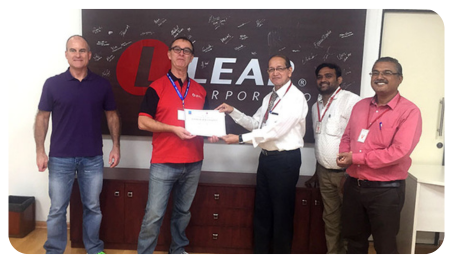Harvey John
Unit 2 Ferry Wharf
Hove Enterprise Centre
Basin Road North
Portslade, East Sussex
BN41 1BD
Two weeks ago we released our first of many features of The Tax Expat when we interviewed David Rito about his relocation to Maastricht – if you missed it, be sure to give it a read!
In summary, every fortnight, we’ll be releasing a new edition of ‘The Tax Expat’, where we dive into the personal stories and experiences of a tax specialist. It’s important to us to keep this varied, so these insights will come from those across all levels – from Tax Assistants to Partners! No matter the level of tax discipline, it’s about bringing unique insights to those who are toying with the idea of relocating.
And this week we’re very pleased to have an Asian contribution from Douglas Mackay who we interviewed about his move from South Africa to China. We’ve said too much already, so without further ado, here it is…
Douglas, it’s great to have you joining us on The Tax Expat – thanks for coming on! With the international background that you’ve accumulated over the years, I was pleased when you offered to share your insights on life in Asia. The APAC region is less travelled amongst our primarily European network, so I’m looking forward to hearing about how you’ve found life in China. But before we dive into your career as an ex-pat, perhaps you can start by telling tell us a few words about yourself.
Sure, I’m Douglas – originally from Cape Town, South Africa – and I moved to Shanghai / Asia with my family back in 2007 to explore new horizons and challenges. Currently, I work as a Director of VAT / Customs for the APAC region of a US multinational.
So, your big relocation story – Where does the story start and what influenced your decision to move abroad from South Africa?
Well, the story starts in 2001 when I was offered the post of Customs Valuation Manager in Angola as part of a Crown Agents customs reform and harmonization project, and I subsequently got to experience life in a brand new culture whilst being able to meet people and other consultants from all over the world!
I soon realized that as experienced as I was, I still had much to learn and I have strived over the years to improve my knowledge, which I suppose is the main reason for adopting a so-called ‘ex-pat life’.
At the end of my contract in 2006, I was looking at options with a Big 4 firm in Kyiv, Ukraine (where my wife is from) when I was headhunted for a Regional Senior Customs & Trade Compliance Manager position based in Shanghai with a US multinational. To be honest, I didn’t think twice about it! The challenge of working in a new culture and the responsibility of managing numerous countries in Asia was the selling ticket!
And job description aside, what did you think about the prospect of moving to Shanghai?
This, of course, is where the regional role was located, but in doing our research we found that Shanghai is a very cosmopolitan city that many ex-pats call ‘home’. T standard of living etc. is all on par with any other country in Asia (some would argue in the world), albeit it’s certainly an expensive place to call ‘home’!. My advice is that one certainly needs to look closely at the package on offer, for housing, schooling etc.
Whilst being based in Shanghai, I had the advantage of being headhunted again, this time in 2008 by another US multinational for a similar Regional role that offered the added responsibility for VAT (Indirect taxes). This did the trick for me as I’ve always wanted to move into an all-around position which included all indirect taxes, not only Customs.
And how are you finding this experience so far?
Fantastic! Shanghai is everything we could have wished for. It’s a great place to live and work, as well as a stepping stone to see the rest of Asia. I also have a great team of locals working with me in Shanghai, including the other countries that I’m responsible for.
For me, the differences between China and South Africa come in four areas:
- You’ll find higher salaries in China due to it having a much stronger economy than South Africa, as well as being an ex-pat (of course this is dependent on the city you are located in!).
- China and Asian cuisine, what more can one ask for (although the Sichuan food can be a tad spicy!)
- Pollution in Asia is a big concern, although Shanghai has made huge changes over the past few years and now, on most days, air quality is acceptable, unlike Beijing or Delhi. One advantage in SE Asia is there is no ‘winter’ to speak of.
- The lifestyle here is very fast and hectic, with long hours, lots of travelling and being away from family.
On the professional side, it has also been exciting to be part of the evolving indirect tax changes in Asia, from the VAT reform program in China to the implementation of GST in Malaysia and India where I was the program lead (Malaysia has now reverted to the old sales tax regime) and all the changes and modernization efforts Customs have implemented in Asia.
One of the common (and popular) moves for global indirect tax professionals at the moment is to move to the Middle East due to the implementation of VAT across the GCC. Subsequently, it’s become something that VAT professionals seem to know a fair bit about as they’ve likely had colleagues make the move. But I do think the rest of the Asian market is still relatively unexplored for those considering a new opportunity. What do you think China (or more broadly, Asia) has to offer the indirect tax professional of today?
Asia and China are still seen as the developing world when it comes to Indirect Taxes such as VAT / GST. India had only implemented GST in 2017, China transformed their VAT pilot program starting back in 2009, and Malaysia tried GST but has now moved back to a sales and service tax.
So a lot is happening here with very few experts. Those who are here tend mostly to work for the Big 4 (including a couple of in-house experts) but not as many as one would expect in this environment.
I’d say the opportunity for growth and development – both professionally and personally – is here in Asia, especially if you are making a career move with your family.
What’s the most important thing you’ve learnt about yourself since moving abroad?
My ability to adapt to circumstances and cultures in the different countries I travel to, being able to communicate with my fellow workers and with government officials. And most of all patience.
And with all the positives aside, what would you say has been the biggest struggle for you in the whole process?
Fortunately, one of my strengths is being able to adapt (I always say to my wife you can put me anywhere and I will adapt to the environment). Of course, arriving in China 12 years ago things were a bit different and it took a while to find our feet and our way around this fantastic city which we now call home.
-And is there anything that you miss in particular?
Sometimes it is the small things; some home food – biltong and a good ‘braai’ – and perhaps watching my favourite sport, rugby in person. And above all, my brother, sisters and the rest of my family (some of my nieces & nephews have never even met!).
I love Biltong and can see how it would be missed! Besides limited access to biltong and, of course, missing family, your experience sounds incredible. How would you rate your relocation experience overall?
12 out of 10. It was the best decision in my life! Our son was born in Shanghai and, for him, this is home.
So Douglas, if you had your time again, what would you have done differently?
Learning the local language as soon as possible. Basic phrases of the other countries that I travel to regularly are useful too. English is spoken in all multinational companies in China and Asia but, for day-to-day life, the average person doesn’t speak English or has a rudimentary understanding. Also, it is extremely important to immerse yourself in different cultures; people are different and even if they communicate with you in your language, it doesn’t mean they/or you understand one another. So be aware of the nuances in the different cultures. If you do not understand this you will not succeed in Asia.
And finally, I’m sure you’ve learnt from many experiences throughout your career. What advice can you share for other tax professionals who are considering a relocation abroad for their careers?
Learn as much as you can about the country before you move there, research the standards of living, schools etc. There’s a difference between the ex-pat taking a short-term assignment and one moving as part of a long-term career strategy.
Once you arrive in-country:
- Make new friends, (besides fellow ex-pats)
- Explore your surroundings
- Get to know the people and culture, and learn the local language
Not everyone is suitable for the ex-pat life and you need to be honest with yourself. Do not take a position purely because of the salary because, believe me, you will not be happy.
Douglas, thank you so much for your time! It was great to hear about your experiences. It’s great that we will be able to share them with our network of tax professionals!
—
Are you a Tax Expat? If so, we’d love to hear about your experiences and share them with our global tax network. For more information, please contact Alex Mann.
If you would like to see our company updates and industry insights, follow us on LinkedIn.
Author

From boutiques to the Big 4, and start-ups to multinational corporations, Alex manages a diverse portfolio of clients worldwide which has enabled him to develop a vast global network of indirect tax and tax technology professionals in 40+ countries.



